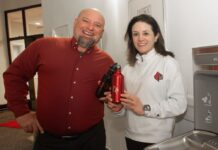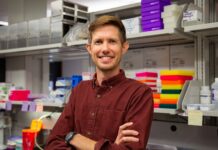LOUISVILLE, Ky. – Scientists have long known our bodies contain good bacteria that help us do things like digest food. But one such organism also may have the ability to protect germs that make us sick, a University of Louisville study has shown.
A research team led by UofL biology professor Michael Perlin found that a strain of E. coli that normally lives harmlessly in our digestive tract can mobilize to protect Salmonella, a microbe that can cause severe gastrointestinal illness.
The discovery is worrisome from a human health standpoint, Perlin said.
“We knew some E. coli strains can leak a substance that makes other E. coli cells around them survive exposure to antibiotics, but we didn’t know they could do that for a totally different kind of bacteria. No one has seen this before. It’s surprising and a little scary.”
An article on Perlin’s three-year study funded by the National Institutes of Health appeared Wednesday in the biology journal of the Proceedings of the Royal Society.
Much research has been devoted to understanding how bacteria become resistant to antibiotics by trading genes with other bacteria. The UofL study, however, identifies an entirely new way microbes can develop resistance. Some act as “altruists,” sharing their resistance with other bacteria without any gene transfer, Perlin’s team found.
Antibiotic resistance is a growing public health problem, with the number of resistant bacteria increasing in the last decade. Many bacterial infections are becoming resistant to commonly prescribed antibiotics, according to the U.S. Centers for Disease Control and Prevention.
NIH figures show that about 90,000 people die each year of a drug-resistant infection, up from 13,300 deaths in 1992.For more information, call Perlin at 502-852-5944 or 502-852-5939.

























